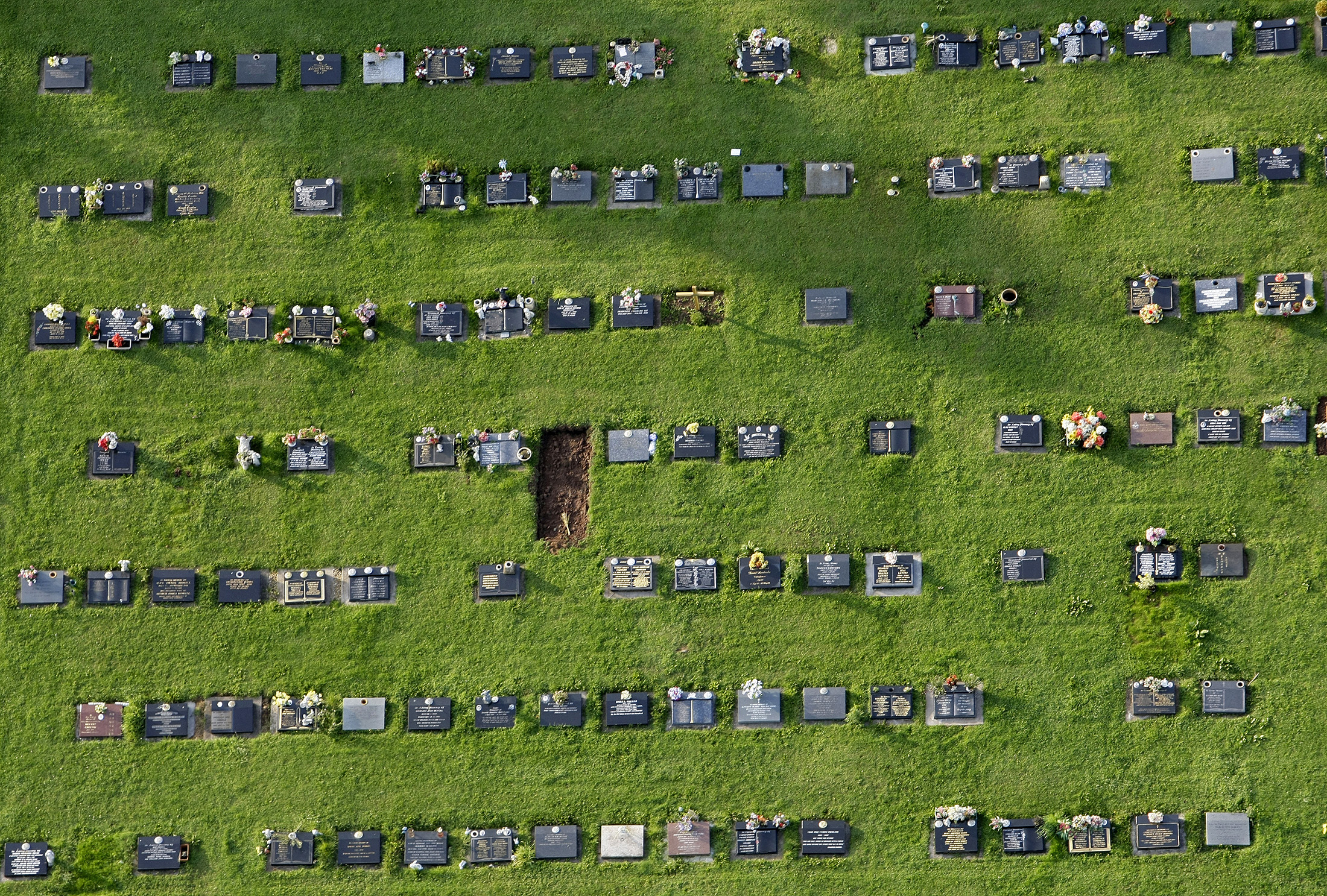Why are so many white women dying young?
Why are so many working-class women in rural America dying in middle age? Addiction, suicide, and an epidemic of despair.

They had been expecting a full processional with a limousine and a police escort, but the limousine never came and the police officer was called away to a suspected drug overdose at the last minute. That left 40 friends and relatives of Anna Marrie Jones stranded outside the funeral home, waiting for instructions from the mortician about what to do next. An uncle of Anna's went to his truck and changed from khakis into overalls. A niece ducked behind the hearse to light her cigarette in the stiff Oklahoma wind.
"Just one more thing for Mom that didn't go as planned," said Tiffany Edwards, the youngest surviving daughter. She climbed into her truck, put on the flashers, and motioned for everyone else to follow behind in their own cars. They formed a makeshift processional of dented pickups and diesel exhaust, driving out of town, onto dirt roads and up to a tiny cemetery bordered by cattle-grazing fields. In the back there was a fresh plot marked by a plastic sign: "Anna Marrie Jones: Born 1961–Died 2016."
Fifty-four years old. Raised on three rural acres. High school educated. A mother of three. Loyal employee of Kmart, Walls Bargain Center, and Dollar Store. These were the facts of her life as printed in the funeral program, and now they had also become clues in an American crisis with implications far beyond the burnt grass and red dirt of central Oklahoma.
Subscribe to The Week
Escape your echo chamber. Get the facts behind the news, plus analysis from multiple perspectives.

Sign up for The Week's Free Newsletters
From our morning news briefing to a weekly Good News Newsletter, get the best of The Week delivered directly to your inbox.
From our morning news briefing to a weekly Good News Newsletter, get the best of The Week delivered directly to your inbox.
White women between 25 and 55 have been dying at accelerating rates over the past decade, a spike in mortality not seen since the AIDS epidemic in the early 1980s. According to recent studies of death certificates, the trend is worse for women in the center of the United States, worse still in rural areas, and worst of all for those in the lower middle class. Drug and alcohol overdose rates for working-age white women have quadrupled. Suicides are up by as much as 50 percent.
What killed Jones was cirrhosis of the liver brought on by heavy drinking. The exact culprit was vodka, whatever brand was on sale, poured into a pint glass 8 ounces at a time. But as Anna's family gathered at the gravesite, they wondered instead about the root causes, which were harder to diagnose and more difficult to solve.
"Life didn't always break her way. She dealt with that sadness," said Candy Payne, the funeral officiant. "She tried her best. She loved her family. But she dabbled in the drinking, and when things got tough the drinking made it harder."
There were plots nearby marked for Jones' friends and relatives who had died in the past decade, at ages 46, 52, and 37. Jones had buried her fiancé, dead at 55. She had eulogized her best friend, dead at 50 from alcohol-induced cirrhosis.
Sign up for Today's Best Articles in your inbox
A free daily email with the biggest news stories of the day – and the best features from TheWeek.com
Other parts of the adjacent land were intended for her children: Davey, 38, her oldest son and most loyal caretaker, who was making it through the day with some of his mother's vodka; Maryann, 33, the middle daughter, who had hitched a ride to the service because she couldn't afford a working car; and Tiffany, 31, who had two daughters of her own, a job at the discount grocery, and enough accumulated stress to make her feel "at least a decade or two older," she said.
Candy, who in addition to being the officiant was also a close family friend, motioned for Tiffany and Maryann to bring over the container holding their mother's cremated remains. They opened the lid and the ashes blew back into their dresses and out into the pasture.
All anyone else had so far was a question, one that has also become the focal point of congressional hearings, health summits, and presidential debates: Why?
Why, after 50 years of progress in life expectancy for every conceivable group of Americans — men, women, young, old, rich, poor, high school dropouts, college graduates, rural, urban, white, black, Hispanic, or Asian — had one demographic group in the past decade experienced a significant percent increase in premature deaths? Why were so many white women reporting precipitous drops in physical health, mental health, comfort, and mobility during their working-age prime? Why, over the past eight years alone, had more than 300,000 of these women essentially chosen to poison themselves?
"It's a loss of hope, a loss of expectations of progress from one generation to the next," said Angus Deaton, a Nobel Prize–winning economist who had studied the data.
"What we're seeing is the strain of inequality on the middle class," President Obama said. "Erosion of the safety net," Hillary Clinton said. "Depression caused by the state of our country," Donald Trump said. "Isolated rural communities," Bernie Sanders said. "Addictive pain pills and narcotics," Marco Rubio said.
There were so many paths in the America of 2016 to what coroners termed "a premature and unnatural death," and one version was what had happened to Jones: Another night of drinking that ended in the emergency room, her seventh trip in the past four years. A diagnosis of end-stage liver failure. A week in a nursing home. A quiet death, followed by burial four days later.
She had been born on the way to the hospital in the back seat of her father's car, the ninth of 10 children, and the family joke was that Anna had never stopped hurtling her way into the world. At a time when life on the far edges of the middle class came with dependable opportunities, her older siblings left home for the quarry, the machine shop, and the military, and Anna moved out along with them, even though she was only 17. She rushed off to get married in Reno, Nevada. She got a job at a Kmart snack bar in California and worked her way up to manager. She was good at making people feel comfortable, at listening without judgment and aligning herself with the customer. She clipped coupons for regulars and gave free drinks to people who couldn't afford them. By the time she reached her mid-20s, Kmart was training her to become a regional manager. She had her own trailer in Ferndale, California, two children, two cars, and a retirement savings account.
But the promotion never materialized and the marriage took work, and after a while her eagerness turned to restlessness. She drank more. She tried drugs. She left Kmart. She was arrested for drinking and for failing to pay her taxes. Her marriage unraveled and she moved home to Oklahoma with the kids. She helped push Maryann and Tiffany to finish high school, and then, once all of her children left home, she lived for a while with her mother, then her daughter, then her fiancé, and finally her son for the last years of her life.
"Sometimes the hard things in life eventually break you," said Kaitlyn, Anna's friend.
Tiffany drove home to a trailer, where everyone was waiting for her, and where all of them needed something. Her 4-year-old daughter wanted dinner. Her disabled 1-year-old daughter had another doctor's appointment in Oklahoma City. Her husband, Chad, needed their car to run errands. Her boss missed her at work. Her brother needed money for rent. And then there was their trailer itself, which they had purchased for $2,000 from a cousin because they wanted to tear it down and put a new trailer on their beautiful country lot. But now it was two years later and they were still in the old trailer, with faulty electricity, a broken shower, and no door for the bathroom.
"A work in progress," Tiffany called it, and sometimes she thought that was true of so many lives in this part of Oklahoma. Goals receded into the distance while reality stretched on for day after day after exhausting day, until it was only natural to desire a little something beyond yourself. Maybe it was just some mindless TV or time on Facebook. Maybe a sleeping pill to ease you through the night. Maybe a prescription narcotic to numb the physical and psychological pain, or a trip to the Indian casino that you couldn't really afford, or some marijuana, or meth, or the drug that had run strongest on both sides of her family for three generations and counting.
"Shot and a beer for Mom?" she said now, raising a shot glass to her husband. He shook his head. She drank the shot and sat down next to him in the living room.
They had gotten drunk with her mother dozens of times, and it was almost always fun. She was a happy drinker who made for good company around a fire, with fun stories and a throaty laugh. After she was diagnosed with cirrhosis in 2009, doctors had said her prognosis was good if she stopped drinking. Her liver had a few years left. She would be eligible for a transplant. And for a few months at a time she had managed to quit, but reality often left her depressed. Her fiancé died. A few nephews were arrested for using drugs. She filed for bankruptcy. Her mother died. She drank until she was too sick to work.
"I could be mean to her sometimes," Tiffany said now, in the living room. "I kept saying to her, 'You're killing yourself.'" "You were just trying to pull her out of the spiral," Chad said.
They each had gone through spirals of their own. Chad had been arrested for driving under the influence three times in the years after his own mother's death before straightening himself out to take care of the children. Tiffany had sometimes been going to work hung over, until she became pregnant, and then she went nine months without a beer or cigarette. "I'm not going to make my problems my kid's problem," she had told her mother then, because there was still hope that her children would have it easier.
"Don't you want to see what your grandchildren become?" Tiffany would ask. "Don't you want to be there for them?"
But even though Anna loved her granddaughters — babysat them, admired the way Tiffany and Chad cared for them, bought them whatever she could — she could never give them that. She quit drinking and then started again, quit and then started. She fell down at her house and broke a leg. She had to use a wheelchair. She lost her car and then her driver's license. She stayed in her living room and watched TV for hours at a time unless Tiffany came to pick her up.
"She had family. She had friends," Tiffany said. "I don't understand why it wasn't enough."
With Anna gone, it was now just Davey left in their home, with bedsheets blocking the windows. His mother's medications were still stacked on the counter. Those were her clothes strewn across the living room, her microwaved jambalaya leftovers in the sink, and her $8.75 liter of Heaven Hill Vodka pushed against the couch. Davey reached for the bottle and took a gulp. He chased it with water and then drank again. "Last day," he said. "Tomorrow it's detox, getting a job, all that."
The day before had also been the last day, and so had the weekend before that, and now it was two weeks until $350 in rent came due on the house. He had no money of his own and nowhere else to go. For the past five years he had been living with his mother and surviving on her disability payments and $197 in food stamps. She had supported him and he had been her caretaker, lifting her out of bed in the mornings and pushing her wheelchair up the hill to a tornado shelter whenever a storm hit. He had monitored her medications, washed her jaundiced skin, and dealt with the diapers.
He had even tried to keep her from drinking, just as the doctors insisted. But he was buying vodka with her money and drinking it in front of her, and she would yell and beg and then threaten to withhold Davey's cash so he couldn't drink, either. Eventually he had decided to compromise by rationing out her liquor. But sometimes he would pass out on the couch or go to the bathroom, and whenever he came back the bottle looked emptier than before.
"Do you blame me?" he had asked Tiffany, a day after the funeral. "You did the best you could," Tiffany told him. "There's no sense obsessing over it."
Davey sipped from the bottle. He lay back on the couch, where lately he had been having a recurring dream. He was sitting in the living room with his mother, a woman not yet 55 who had some color back in her cheeks and her hair in a braid. He wanted to be honest with her, to tell her she was dying, and finally he blurted it out: You're dying, he said, but she didn't look back at him. You're dying, he said again. You're dying! But the TV was blaring, the bottle was in her hands, her eyes were glazed over, and she was too far gone to hear him.
Excerpted from an article that originally appeared in The Washington Post. Reprinted with permission.
-
 Prevost elected first US pope, becomes Leo XIV
Prevost elected first US pope, becomes Leo XIVspeed read Cardinal Robert Francis Prevost is a Chicago native who spent decades living in Peru
-
 'Art is one of humanity's great empathic mediums'
'Art is one of humanity's great empathic mediums'Instant Opinion Opinion, comment and editorials of the day
-
 Today's political cartoons - May 9, 2025
Today's political cartoons - May 9, 2025Cartoons Friday's cartoons - India-Pakistan tensions, pope hopeful, and more
-
 'Once the best in the Middle East,' Beirut hospital pleads for fuel as it faces shutdown
'Once the best in the Middle East,' Beirut hospital pleads for fuel as it faces shutdownSpeed Read
-
 Israeli airstrikes kill senior Hamas figures
Israeli airstrikes kill senior Hamas figuresSpeed Read
-
 An anti-vax conspiracy theory is apparently making anti-maskers consider masking up, social distancing
An anti-vax conspiracy theory is apparently making anti-maskers consider masking up, social distancingSpeed Read
-
 Fighting between Israel and Hamas intensifies, with dozens dead
Fighting between Israel and Hamas intensifies, with dozens deadSpeed Read
-
 United States shares 'serious concerns' with Israel over planned evictions
United States shares 'serious concerns' with Israel over planned evictionsSpeed Read
-
 Police raid in Rio de Janeiro favela leaves at least 25 dead
Police raid in Rio de Janeiro favela leaves at least 25 deadSpeed Read
-
 Derek Chauvin's attorney files motion for new trial
Derek Chauvin's attorney files motion for new trialSpeed Read
-
 At least 20 dead after Mexico City commuter train splits in overpass collapse
At least 20 dead after Mexico City commuter train splits in overpass collapseSpeed Read